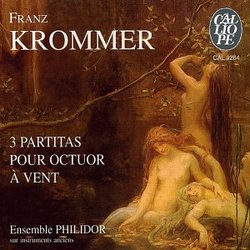| All Artists: Franz Krommer, Ensemble Philidor Title: Krommer: Partitas for Wind Octet - Partita No. 73 in F Major (World Premiere Recording); Partita Op. 57 in F Major; Partita Op. 79 in E-flat Major Members Wishing: 0 Total Copies: 0 Label: Calliope France Release Date: 12/14/1999 Album Type: Import Genre: Classical Styles: Chamber Music, Historical Periods, Classical (c.1770-1830) Number of Discs: 1 SwapaCD Credits: 1 UPC: 794881488827 |
Search - Franz Krommer, Ensemble Philidor :: Krommer: Partitas for Wind Octet - Partita No. 73 in F Major (World Premiere Recording); Partita Op. 57 in F Major; Partita Op. 79 in E-flat Major
CD Details |
CD ReviewsPeriod performances with unique sound Larry VanDeSande | Mason, Michigan United States | 09/12/2006 (4 out of 5 stars) "This recording, made in 1999 and no longer available in USA but still available in France, was one of the first recordings of Krommer's octet-partitas using period instruments. A later period instrument recording, by the Amphion Bläseroktett on the Pan Classics label, suprecedes this recording musically. The snag is that one's no longer avaialable anywhere, either.
This production suggests it was a premiere recording of the Partita No. 73; unfortunately, that is not so as La Gran Partita recorded Op. 73 (not No. 73) in 1996 on Tudor 7027. That recording is still listed on Amazaon USA (ASIN: B000003WXD) and may be avialable used. If not, it can still be acquired from the manufacturer -- www.tudor.com. That little problem aside, this recording is a good one albeit somewhat underpowered and undercharacterized. It was given a preferred rating in Third Ear Classical Music, where the critic suggested you could hardly tell the players were using period instruments. I beg to differ on that suggestion, as well. The difference is most clearly delineated in the closing movement of Op. 57, which is perhaps Krommer's most popular octet, when the principal horn player performs pyrotechnics in a solo. The sound of Camille Leroy's instrument becomes faint as he ascends during the arpeggios. Compare this to the playing from horn player Bruno Schneider in the closing alla pollaca to hear really distinguished playing (Schneider is lead horn player in the Sabine Meyer Wind Ensemble's recording of Op. 73 on RCA.) There are plenty of good things going on here, however. First, the playing is exceptional most of the time, especially in the adagio and andante sections, where the players uninimity and elegance suggests another level of performance for this music. Second, the recording is exceptional for this kind of music. It provides a clear sound field that is unusually distinguished on a left to right linear basis where each player can be identified and heard. Listen to the opening section of Op. 73, the first entry on the CD, to hear how players hand off the lead to each other. The recording per se lends much to felicitious playing of this enjoyable music. This CD is a keeper for certain but does not diminish the overall sheen La Gran Partita possesses in this repertoire. That group uses modern instruments and is recorded more clearly, allowing you to hear everything a bit better than here. Their pacing is a bit more urgent and exciting in the music, as well. For all the good put forward here by Ensemble Phildor, La Gran Partita is still the champion in this repertoire, from my perspective. Between Tudor 7001 and and the aforementioned Tudor 7027, La Gran Partita recorded eight of Krommer's delicious creations in modern DDD sound using modern instruments. They are not listed in USA right now and can be acquired from the manufacturer. Hopefully, all these CDs will return to currency in USA someday soon. Tudor recently circulated a 2003 recording of Krommer's Op. 76 octet-partita with three other similar repertoire pieces in USA. That's a worthwhile recording of Krommer's music you should grab while it is available (ASIN: B0000DGR9D see my review from August 6, 2006)." |

